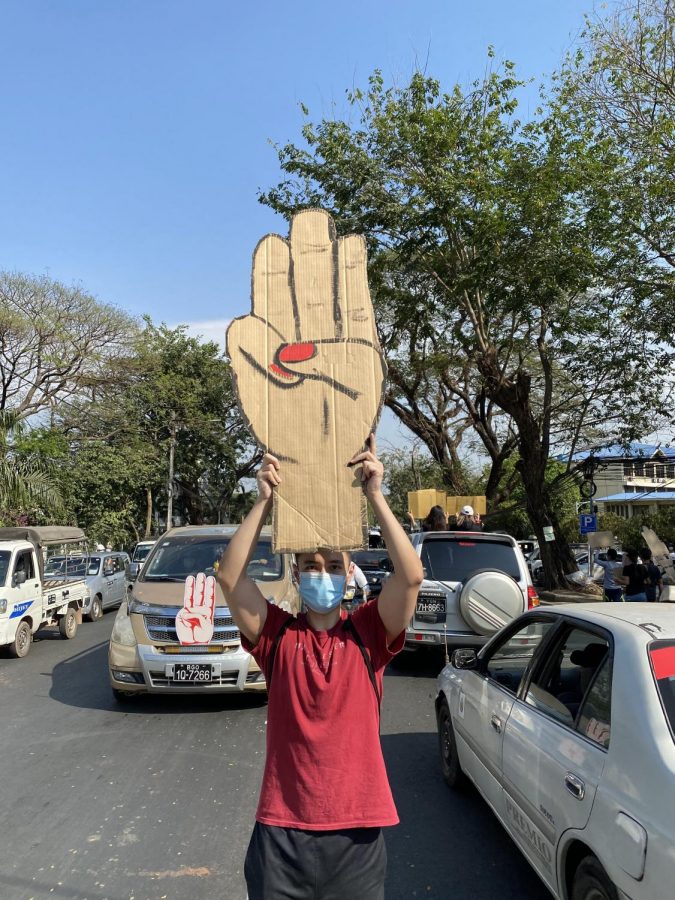Military coup In Myanmar upends Macalester students, alums’ lives
Thet Win Htut ’17 participates in a protest against the military coup in Yangon, Myanmar. Photo courtesy of Myat Thura.
February 11, 2021
On the morning of Feb. 1, Thant Arkar Kyaw ’24 woke up to a call from his friend Kyaw Za Zaw ‘22. There had been a military coup in their home country of Myanmar. Arkar is currently living in St. Paul, but most of his family still lives in the Southeast Asian nation.
Arkar called his parents that day, but a day later, Myanmar’s military restricted internet and cell phone service, meaning that Arkar could no longer consistently contact them.
“It is honestly like a civil war,” Arkar said. “I thought I wouldn’t be affected as much, but I actually noticed from the second day the internet cut out that I really cannot focus.”
Myanmar’s military, known as the Tatmadaw, deposed the country’s democratically elected government on Feb. 1, detaining the country’s top elected officials and declaring a one-year long state of emergency, effectively seizing control of the government.
For Macalester students and alumni from Myanmar, the coup has upended life as they know it.
Thet Win Htut ’17 lives in Yangon, the largest city in Myanmar.
“At first when they started rolling out the tanks on the streets, I really thought that it was just for show, and then came February 1st,” Htut said. “It came as a shock.”
He has been involved in daily protests that began on Feb. 6 and said that despite the military force, thousands of people turn out each day to oppose the coup.
“I live on a main road, and each day it just gets more crowded,” Htut said.
Democracy in Myanmar is still relatively new. The country gained independence from the British empire in 1948, and from 1962 to 2011 the country was under the control of a military dictatorship.
2011 marked the beginning of reforms in the country led by pro-democracy leader Aung Sann Suu Kyi and her party, the National League for Democracy. Suu Kyi and her party won a landslide victory in the 2012 by-election, ushering an era of democracy in the country.
But now, democracy in Myanmar is in limbo.
“If [the military] were to win, the worst case scenario, they succeeded in their coup, it means …the end of Myanmar as a country,” Arkar said.
Arkar is worried about his family back home as military force intensifies. The Tatmadaw has cracked down on protesters in recent days, imposing a curfew and martial law on Feb. 8 and unleashing water cannons and rubber bullets on protesters in the streets after hours. The Tatmadaw is also allegedly monitoring their citizens’ online communication in an attempt to quash dissent.
Arkar said that news of the coup has disrupted his focus on course work at Macalester — but his professors are supportive.
“My teachers are supporting me,” Arkar said. “They are telling me that I can take extensions as much as I need.”
But beyond just individual support, Burmese Macalester students and alums hope to see Macalester take stronger action and publicly denounce the coup. Several current Burmese students and alumni authored a petition addressed to President Suzanne Rivera and the Macalester community titled “Call for Macalester Action on Myanmar’s Military Coup.”
It asks Macalester to publicly condemn the Tatmadaw, extend mental health resources to Burmese students and provide financial and housing support to Burmese students who are unable to travel back to their home country.
When contacted by The Mac Weekly on Wednesday, President Rivera said she had not yet seen the petition and that it was not sent to her email prior to that day.
In response, Rivera denounced the coup and detailed the resources available to Macalester’s Burmese students through International Student Programs and the Laurie Hamre Center for Health and Wellness. She said that Burmese students qualify for emergency assistance, meaning that they can stay on campus over winter or summer break if they are unable to return home.
“We condemn violence and believe the people of Myanmar should be able to select their own leaders through free and fair elections,” Rivera said.
Although Htut is glad to see Macalester supporting Burmese students via school resources, he hopes that the school will issue a statement publicly denouncing the coup.
“There’s no reason for Macalester to not say anything about what’s happening now in Myanmar,” Htut said. “Macalester’s focus on internationalism inspires me and I hope Macalester continues to speak for us.”
For Arkar, the coup has inspired him to speak up about politics and use his social media to raise awareness — something he usually does not do.
“[My father] told me that in the worst case scenario, if the military actually were to succeed in their fraudulent plan to change the voting result and “won” the election, he told me to never come back and set foot in Myanmar ever again,” Arkar wrote in a public Facebook post. “If this worst case were to happen, it would mean the end of Myanmar. Meaning no future for future generations.”
He hopes that widespread awareness of the coup will help prevent the military from seizing power and ensure a future for him and his family in the country.
“I even fear that Myanmar would even cease to exist if the military won,” Arkar wrote. “So please! Help Myanmar from this hell hole and help us pave a better future for the country and our next generation.”














